Gastric Bypass Surgery: The Solution to Obesity and Weight Loss
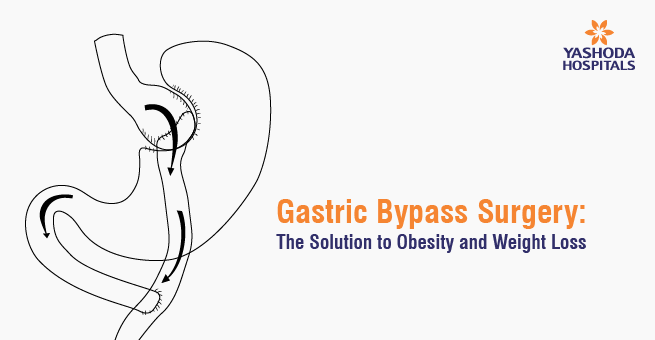
1. Introduction to Gastric Bypass Surgery
2. Indications for Gastric Bypass Surgery
3. Advantages of Gastric Bypass Surgery
4. Gastric Bypass Surgery Risks
5. Gastric Bypass Surgery Complications
6. Gastric Bypass Side Effects
7. Gastric Bypass Surgery Before and After
8. Gastric Bypass Surgery Recovery Time
Gastric bypass is a proven weight loss solution widely performed and considered the gold standard in bariatric surgery due to its long-term success rates and ability to address obesity-related health conditions. However, many may have doubts about this procedure, so we will discuss and elaborate on this procedure completely.
Introduction to Gastric Bypass Surgery
A gastric bypass procedure, also known as “Roux-en-Y” in French, is a weight loss surgery that alters the way the stomach and small intestine handle food, resulting in fewer calories consumed and absorbed by modifying both the stomach and small intestine. The Roux en Y gastric bypass process is influenced by its way of altering the gastrointestinal tract. The phrase “Roux-en-Y” refers to a Y-shaped structure. Hence, this procedure splits the stomach section from the intestine part so that both could be reconnected after cutting them through that “Y” shape.
Gastric bypass has proven to be helpful in losing weight by delivering a stomach restriction for food, thus reducing calories and nutrient absorption from the body as well as changing gut hormones that promote satiety. The obesity-related metabolic syndrome is also halted by gastric bypass surgery.
Commonly known as the “gold standard” for weight loss, Roux en Y gastric bypass is one of the most performed bariatric surgeries worldwide. This procedure commences by creating a tiny pouch in the stomach, which is separated from its other portions, while partitioning is done on the small intestine, whereby the upper end of this bowel along with the bottom one gets attached to it. An opening between this small pouch and the lower gut gives way for passage of food mixed with acids and enzymes used in digestion through a bypassed stomach portion plus the first segment of the small intestine.
Indications for Gastric Bypass Surgery
The UK and US National Institutes for Clinical Excellence have issued guidelines for gastric bypass surgery requiring the following gastric bypass surgery indications to be included:
- Extreme obesity: BMI 40 or higher.
- Obesity: BMI 35 to 39.9.
- Serious weight-related health problems: Type 2 diabetes, high blood pressure, dyslipidemia, fatty liver disease, nonalcoholic steatohepatitis, and severe sleep apnea.
- Failure of non-surgical alternatives: Nonoperative measures failed to maintain weight loss for >6 months.
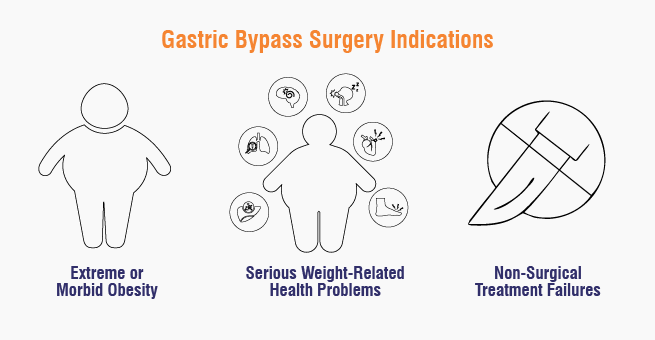
Rediscover Your Confidence And Start The Weight-Loss Journey Today!
Advantages of Gastric Bypass Surgery
For people suffering from morbid obesity and related illnesses, gastric bypass surgery, particularly Roux-en-Y gastric bypass, has a number of major benefits, which include:
- Weight loss and improved health: Patients lose a significant amount of their extra weight, which in turn leads to enormous health benefits.
- Better cardiovascular health: A person’s risk of coronary heart disease, stroke, and peripheral heart disease decreases after gastric bypass surgery. Moreover, some research shows that the weight loss caused by this operation may also eliminate possible reasons for dying from stroke, hypertension, and myocardial infarction. The blood pressure may normalize or almost normalize after the surgery, and all these things help improve the chances of living longer lives.
- Resolution of comorbidities: Many conditions related to obesity, like type 2 diabetes, hypertension, sleep apnea, and heart disease, usually improve or completely resolve after this surgical procedure.
- Relief from depression: Obesity can lead to feelings of sadness linked with self-hatred or being looked down upon in society at large, mostly among adolescents. It is better for one’s mental health if they shed off extra body mass through exercise or dieting. For instance, people who go for an operation to lose their body weight find themselves happier than before they underwent it. Therefore, this indicates that obese people may feel less sadness when we compare them to individuals who remain overweight without undergoing any surgical procedure aimed at reducing excessive weight.
- Fertility improvement: Gastric bypass surgery can enhance fertility, potentially reducing miscarriage risk and improving menstrual cycles in women who don’t ovulate, according to a study.
- Relief from joint pain: Excessive weight can cause chronic pain and joint damage due to stress on weight-bearing joints. Gastric bypass surgery can alleviate this stress, allowing people to stop using pain medications and enjoy increased mobility, thereby reducing the need for pain medication.
- Body posture: Weight loss can significantly improve body posture and overall well-being.
Other conditions: Gastric bypass band surgery promotes losing excess weight and can alleviate multiple medical conditions, such as pregnancy complications, gallbladder disease, and metabolic syndrome.
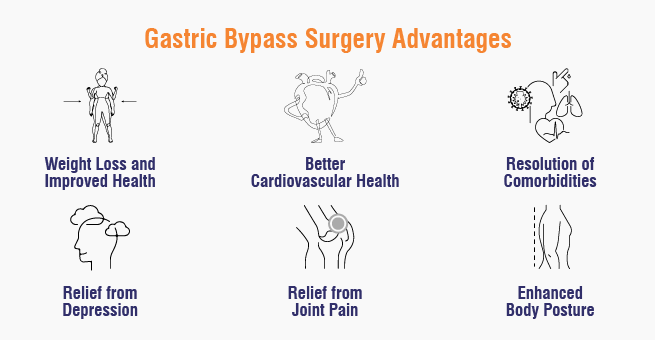
Gastric Bypass Surgery Risks
Some of the possible risks associated with gastric bypass surgery include:
- Infection
- Bleeding
- Formation of blood clots
- Breathing abnormalities
- Anesthesia reactions
- Injury to the nearby organs
- Scarring inside the abdomen and more
Gastric Bypass Surgery Complications
There might be a chance for complications after gastric bypass surgery in some cases. However, most of the complications can be managed. Some of the common gastric bypass complications include:
- Hernia
- Anastomotic leaks
- Bowel obstruction
- Peritonitis
- Dumping syndrome
- Formation of gallstones
- Obesity regaining
- Formation of ulcers
Note: All these complications do not have to occur in every individual, but only in some rare cases.
Gastric Bypass Side Effects
Short-term side effects of gastric bypass surgery include:
- Nausea, vomiting, site pain.
- Fatigue due to surgery and dietary changes.
- Constipation or diarrhea due to digestive system adjustments.
Apart from this, there might be some long-term side effects which include:
- Acid reflux and vomiting.
- Hair loss and skin problems.
- Psychological issues.
- Malnutrition, body image concerns and more.
Note: All these side effects do not have to occur in every individual, but only in some rare cases.
Gastric Bypass Surgery Before and After
Before surgery, healthcare specialists evaluate candidates for surgery by assessing their commitment to lifestyle changes, physical and mental fitness, and weight loss attempts. They may screen for mental health issues and alcohol or tobacco use. A comprehensive evaluation, including medical history, physical exam, psychological evaluation, blood tests, and an ECG and chest X-ray, is conducted.
To help food pass smoothly, this procedure divides the stomach into a pouch. Next, the small intestine is cut and reconnected to a trunk, with its new branch going through the stomach pouch while the original duodenum produces digestive juices. Though less food is absorbed due to a shorter route, digestion occurs properly.
After the surgery, patients typically spend one to four days in the hospital with tubes for draining fluids and catheters for urine removal. They may not eat anything for one to three days, then only consume liquids with soft foods. Special stockings and shots are worn to prevent blood clots, and medication for pain relief is provided.
Gastric Bypass Diet: What To Eat After The Surgery
Many people are confused about what to eat after a gastric bypass and how to eat after gastric bypass. In order to make it clear, the post- surgery diet plan involves stages determined by the bariatric surgery team or dietitian, emphasizing portion sizes to help maintain weight loss and prepare for lifelong eating habits. Whatever it is, the suggested diet after gastric bypass is as follows:
- Stage-1: During stage 1, a liquid diet is implemented to aid in body healing and prevent postoperative complications. Initial intake is limited to clear liquids, gradually increasing to other types like decaffeinated coffee, tea, milk, soup, and ice pops.
- Stage-2: The second stage of a pureed diet involves the intake of thick, pudding-like foodstuffs, which may be prepared using a food processor or a blender at home. Foods that tend to be fibrous, like seeds and spice-laden seasonings, shouldn’t be included, but fruits, vegetables, and varied proteins such as yogurt, scrambled eggs, and cottage cheese should be liquefied instead. It is important to note that in this phase, fluids should not be taken during meals.
- Stage-3: Stage 3 is when soft foods are recommended to be consumed, and they will include items such as soft-boiled eggs, cottage cheese, baked white fish, fresh fruits, and cooked vegetables. Taking bites in small amounts is important here; thus, one shouldn’t forget about how much they eat.
- Stage-4: The gastric bypass diet’s Stage 4 is when solid foods can be reintroduced after surgery, which usually occurs two months later. In order to prevent blockage, it is best to dice or chop up food into small portions. New foods should be introduced gradually in order to check for tolerance levels in your stomach as well as stay away from anything that might make you feel uneasy, sick, or might make you vomit.
Some of the dietary precautions to be followed post-surgery are:
- Consume 64 ounces or 8 cups of fluid daily.
• Sip fluids between meals.
• Avoid drinking within half an hour of meal times.
• Eat slowly to avoid dumping syndrome.
• Choose low-fat, protein-rich food over alcohol.
• Restrict stimulants like caffeine.
• Take prescribed vitamins and minerals.
• Chew food until pureed before ingestion.
Things You Can’t Do After Gastric Bypass Surgery
- Post-surgery, a balanced diet and regular physical activity are crucial for weight loss, with significant benefits to be gained from these lifestyle changes.
- Avoid certain foods and drinks, such as carbonated beverages, alcohol, sugary beverages, bread, raw vegetables, tough meats, red meat, and fried foods.
- After surgery, do not raise anything weighing more than 20 to 30 pounds; don’t even try pushing or pulling things like vacuums during the first six weeks. For the first three months post-surgery, avoid hard labor, including lifting heavy items, carrying them, or thrusting them.
- Avoid lifting anything heavier than 20 to 30 pounds or doing push or pull motions such as vacuuming during the first six weeks after surgery. Moreover, don’t carry heavy things above 25 pounds while doing any other type of physical work, for instance, those related to construction or agriculture.
- Long periods of sitting and standing without moving around should be avoided at all costs. While sitting, change positions often; instead of standing still, walk around instead. These strategies can assist in preventing the formation of blood clots in the legs. Thus, climbing stairs is encouraged.
Gastric Bypass Surgery Recovery Time
Patients remain in the hospital for one to four days after surgery. They can go home when they are able to consume liquid or ground food without vomiting, walk without much pain, and do not need pain-relieving drugs through drips or needles. After that, one will need some weeks to recover at home before getting back to work. It might be necessary to keep away from vigorous exercises for as long as six weeks, while it could take as much as twelve weeks to regain a regular eating pattern.
Gastric Bypass Surgery Pros and Cons
Pros:
- Weight loss
- Improved health
- Energy levels
- Quality of life
- Potential resolution of diabetes, high blood pressure, sleep apnea, heart disease
- Enhances self-esteem.
Cons:
- High surgical risks
- Long-term complications
- Lifestyle changes
- Psychological challenges
- Reversibility
- High costs
Gastric Bypass Success Rate
On average, gastric bypass results in 70% weight loss in the initial years. A long-term study found that 93% of gastric bypass surgery patients maintained at least 10% weight loss from their baseline, 70% maintained 20% excess weight loss, and 40% maintained at least 30% weight loss after 12 years. Although not perfect, many patients managed to keep a good percentage. Gastric bypass surgery is considered the “gold standard” in weight loss surgeries.
Conclusion
Yashoda hospitals have a team of experienced bariatric specialists who use advanced technology for complex gastric bypass surgery. The decision to undergo this procedure requires careful consideration, and it’s crucial to weigh the benefits and risks with your healthcare provider. The team recommends effective treatment options to regulate metabolism, blood sugar, and appetite for weight loss. With a proven track record in bariatric surgery, Yashoda hospitals ensure a safe and predictable experience for each patient throughout their weight loss journey.
References:
- Introduction: https://medlineplus.gov/ency/article/007199.htm
- Indications: https://www.ncbi.nlm.nih.gov/books/NBK553157/
- Advantages and risks:https://my.clevelandclinic.org/health/treatments/17157-gastric-bypass-surgery
- Complications: https://www.mayoclinic.org/tests-procedures/bariatric-surgery/about/pac-20394258
- Pros and cons: https://www.webmd.com/obesity/is-weight-loss-surgery-right-for-you
About Author –
Dr. D. S. Sai Babu, Senior Consultant Surgical Gastroenterologist and Hepato-Pancreatico-Biliary-Surgeon , Yashoda Hospitals – Hyderabad
MS, FSGE, FMAS, FBMS (Bariatric & Metabolic), FAIAS





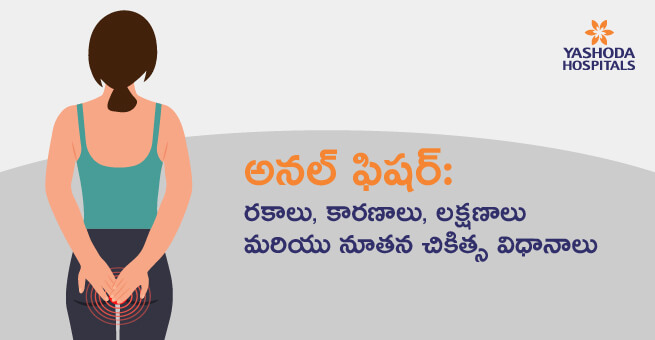

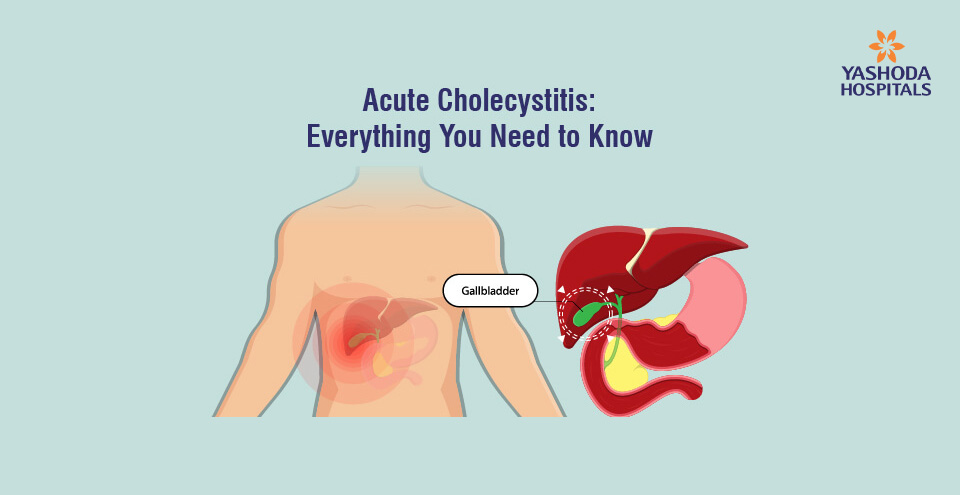
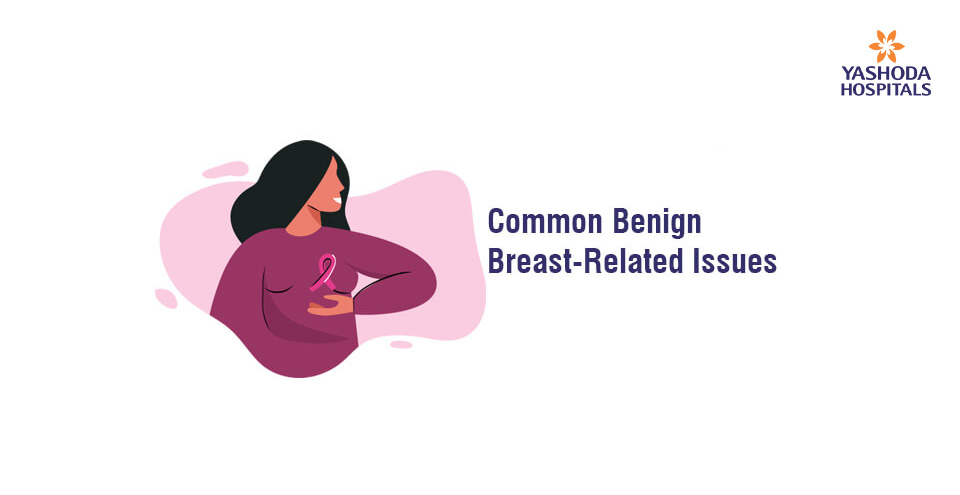





 Appointment
Appointment WhatsApp
WhatsApp Call
Call More
More

